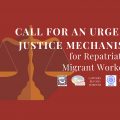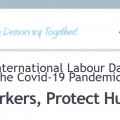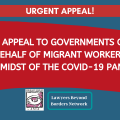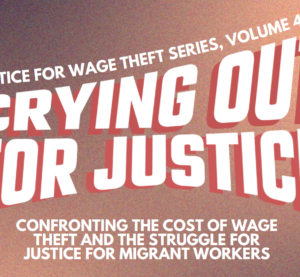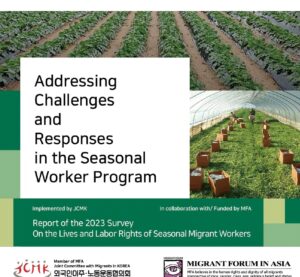Uphold Migrants’ Rights in Times of Crisis Situations
— March 30, 2020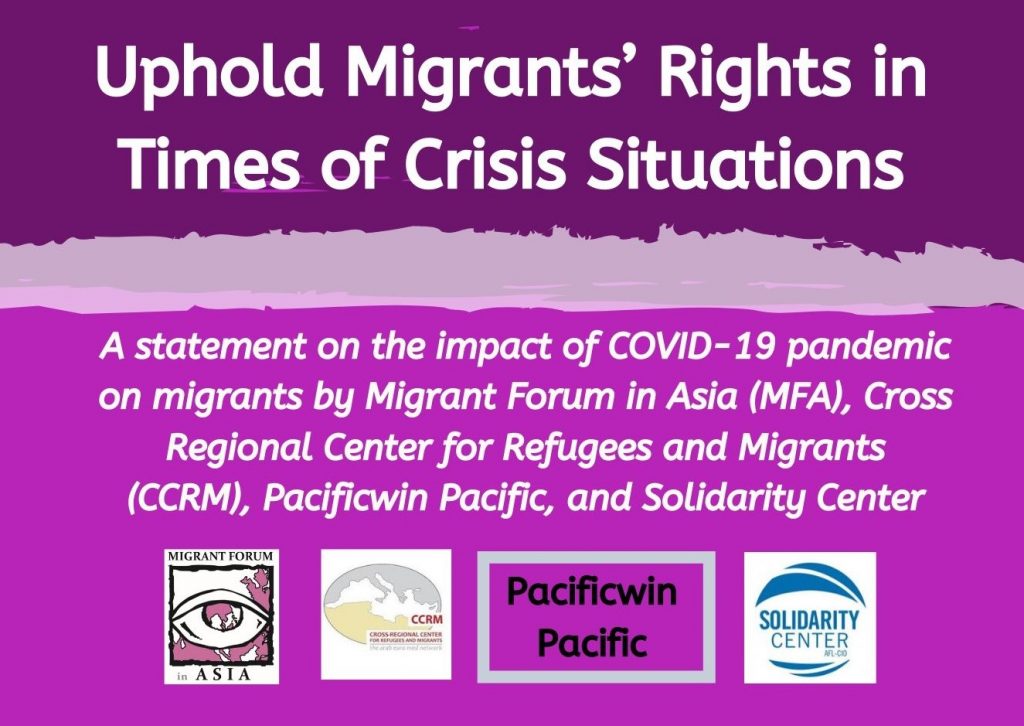
A statement on the impact of COVID-19 pandemic on migrants by Migrant Forum in Asia (MFA), Cross Regional Center for Refugees and Migrants (CCRM), Pacificwin Pacific, and Solidarity Center
The dramatic increase in COVID-19 cases and its alarming spread in many parts of the world have further undermined the situation of those who are in the most vulnerable sectors, among them migrant workers. The global pandemic further reveals how migrant workers are more visibly discriminated against and denied their human rights. Migrant Forum in Asia considers that in this time there is a particularly urgent need to call for upholding of migrants’ rights as human rights.
The Plight of Migrant Workers amid the COVID-19 Pandemic
The COVID 19 outbreak has demonstrated that no government was adequately prepared to deal with a health emergency of this scale. As governments scramble to find adequate responses to address the pandemic, we see that many migrant workers are the first to be left behind.
We have seen multiple examples where migrants are required to pay for testing and treatment. Undocumented migrant workers are denied health care and are rounded up for detention and deportation. In a pandemic, excluding a community from access to healthcare threatens the health security of all.
Some countries have deported migrant workers out of fear that they might spread COVID-19. A number of governments have targeted migrants as scapegoats; blaming them for spreading the disease. Some other deportations have been done on the pretext of migrant workers’ disobedience on rules of social distancing and non-gathering.
Many migrants are currently stranded in transit or in countries of destination as governments impose travel bans and close their borders, while many others are stranded in countries of origin, awaiting deployment, not knowing if they still have the jobs to which they were to be deployed. Some are seeing their recruitment costs mount as they wait.
The COVID-19 pandemic, while largely an issue of health, is also an economic issue for our migrant workers. Many will be at the receiving end of the most severe impact of economic recession. As major industries close down, migrant workers are among the first to be let go. We have received reports of many workers deported to their countries of origin while being denied their salaries and benefits.
Migrant workers who work in the care sector are at the frontlines of this pandemic. As health systems in many countries get overwhelmed, migrant workers will bear a disproportionate burden.
Migrant workers in the service industry, such as on cruise ships, were among the first to deal with COVID-19 infected persons. These workers were provided with little or no protection as they catered to the needs of infected people. As travel restrictions shut down the industry, the same workers were the first ones to be let go. Many of them were not paid their salaries or benefits. Some of the infected workers were not provided support to access treatment.
Many migrant workers continue to live in crowded, squalid and confined spaces. With imposed quarantines, many migrants face barriers for preventing further outbreaks. Lack of decent housing and accommodation, shared facilities and amenities, difficulty in implementing protective measures, such as social distancing – these obstacles could further trigger the spread of the virus. Migrant workers are also affected by limited rights to communication with family and friends, due to restricted access to video and web calling services – furthering their isolation and affecting their mental health.
Migrant domestic workers who reside in-house with their employers will be spending their due non-work days and time in the same place. Imposed quarantines may force many workers to spend their entitled rest days and time working. In many places, societies see restrictions on domestic workers’ movements as a justified means of protecting their employers from infection, while not expecting a similar restraint on the part of their employers. Further, it may increase the potential for workers to be further abused, particularly migrant women workers.
As the world continues to be overwhelmed by the pandemic, we commend the efforts of governments who have included migrants in their public health responses and plans. Such measures are a clear recognition that the health and safety of a society, depends on the health and safety of all. We also appreciate the efforts of governments that implemented measures to provide free testing and treatment for documented and undocumented migrants.
We welcome the initiatives of countries of origin to repatriate and rescue migrants who are stranded or have lost their jobs in countries of destination. We further acknowledge the initiative of governments of countries of origin in providing immediate support for testing and treatment of returnee migrants who have been fund positive.
We applaud migrant organizations and migrant leaders who, despite the quarantine and lockdown, continue to provide much needed services for migrant communities at the risk of their own safety. We also recognize the efforts of organizations ensuring that appropriate and accurate information reaches the most vulnerable migrant communities.
Recommendations
In light of the impact of the ongoing COVID 19 crisis on migrant workers, we call on all governments to uphold migrants’ rights and include all migrants, regardless of their status, in their efforts, strategies and plans to address the crisis and “flatten the curve”.
For Countries of Destination:
- We urge governments to uphold migrants’ human rights in their responses for addressing the COVID-19 health crisis. Governments should not discriminate in providing access to health care including testing and treatment for COVID-19. Migrants, regardless of their status, should have access to free screening and treatment for COVID-19 without fear of arrest and detention.
- We urge governments to provide migrants with access to correct information in a timely manner concerning measures to address COVID-19. Information should be provided in accessible languages of migrant communities. Governments should work with missions / embassies and migrant community organizations in translating, interpreting and delivering correct information to migrant workers.
- With many countries choosing to close their borders, we call on governments to stop the immediate deportation of migrant workers.
- With many businesses closing down as a result of COVID-19, we call on governments to ensure that migrants who have lost their jobs receive their entitled salaries, wages, and benefits before they are sent home.
- Migrant workers employed in the health care sector are crucial in the battle to address this crisis, we urge governments to ensure their fundamental rights at work, including care for their own health are met.
- Migrant workers employed in essential services during quarantine are forced to work long hours with little no protective equipment. We urge governments to monitor companies and industries who continue to operate during quarantine to ensure that they provide workers with appropriate protection measures against COVID-19.
- We urge governments to keep remittance centers open and to allow migrants to send remittance to their families during quarantine.
- Ensure that migrants who are infected and have recovered from COVID-19 are provided with health clearance to enable them to go back to work or return to their country of origin.
- When the global economy recovers after the crisis, many migrant workers will once again be needed in a number of industries. We call on governments to facilitate the re-deployment of workers according to the best practices and guidelines, and to prohibit the extraction of extra recruitment fees from them by middlemen or employers.
Specific to Countries of Origin we have the following recommendations:
- We call on governments to assist and help in the repatriation of migrant workers who are stranded in transit or in countries of destination as countries start closing their borders due to the health crisis.
- We call on governments to ensure that returnee migrant workers from infected countries are able to access health care including testing and treatments for COVID 19.
- We urge governments to ensure that missions and embassies disseminate correct and timely information to migrant workers in countries of destination.
- We urge governments to keep remittance centers open during quarantine and allow migrant families to access much needed funds to help them during the crisis.
- We call on governments to ensure that migrants who have lost their jobs are fully compensated and able to access their benefits before returning home.
- We call on governments to re-evaluate their labour export policy and dependence on migrant remittances to support the economy. Migration should be an option and not a necessity.
We urge international and community organisations to stand firm in the face of this crisis and the resulting adversities; and we wish you all good health as you take limited care of migrant communities.
To download the PDF file of the statement click on the link below:


